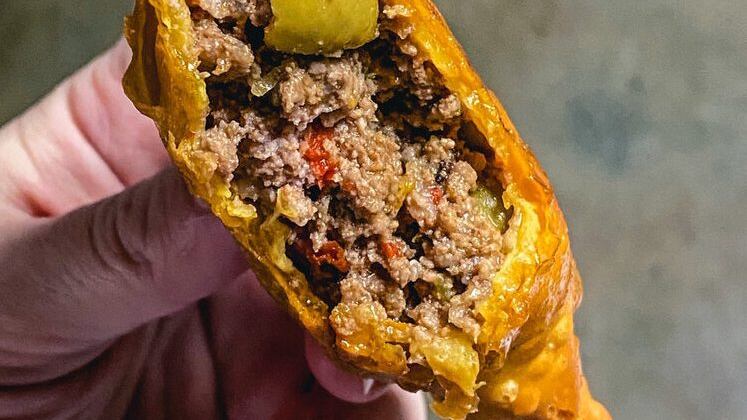There is an intra-island rivalry in Puerto Rico over the best plantilla, the dough that cocoons the beloved hand-held treat the pastelillo.
Pastelillos are folded pockets of pastry, stuffed to the edges with sweet or savory filling then fried. Across Puerto Rico, three primary brands fight to gain allegiance with their signature pastelillo dough—Titan, Mayagüezanas, and Kikuet—and one's plantilla preference can fuel familial rifts.
Such is the case with chef Cristina Baez. Though her sister vehemently disagrees, Baez chooses Titan every time.
Now, Baez ships the bright yellow pastelillo dough from Puerto Rico to the door of her new Portland tiendita, Aybendito. This true-to-source dough is critical to the flavors Baez is after. At Aybendito, Baez cooks food that hits what she calls "the pocket"—that intangible space we each have, close to the heart, that's itching to be filled with a comforting bite of food.
It's for that reason she sources her plantillas from Puerto Rico instead of making them herself.
"You can try and remake a Twinkie," she says, "but it's not gonna be a Twinkie."
Aybendito doesn't sell Hostess snacks, but rather the street food Baez grew up with. The online marketplace is stocked with sofrito canéles to replace your stale bullion, chimichurri, limited-availability pernil and pollo guisado, flan, and the staple pastelillo. The juicy, crunchy snack is ubiquitous in Puerto Rico. They're sold at public schools for 50 cents a pop, on the beaches from carts—and they're great for a hangover.
Pastelillos is also the food she associates with home, of island barbecues and inviting neighbors and family to share in a fried bite. Appropriately, a sense of family underpins the food and methods of Aybendito. Baez was classically trained at the Culinary Institute of America in New York and can whip up, in her words, "fancy food, whatever that means." Indeed, along with husband Jose Chesa, she co-owns two of Portland's fine-dining Spanish establishments, Ataula and Masia.
But her newest venture is an intentional nod to the homey stuff everyone loves. It's the food Baez's mother made her, and it's what she makes for her kids.
"As a mom, I identify with parents who are buying this food," Baez says. "I have two little ones and I have to work."
The goal of feeding families inspired her pandemic-ready take-and-make model. Customers can browse the small online store that Baez stocks and place an order for pickup once every two weeks. All items come vacuum-sealed with instructions how to quickly cook them at home or freeze until ready.
For Baez, there are joyful moments to be found amid this shift to a new dining experience. Her personal cellphone number is on the website so customers can ask questions about cooking techniques and share photos of leveling up their Hot Pocket game by ripping into a steaming pepperoni pizza pastelillo.
"Some people might not consider it fine dining," Baez says, "but like, it's so fucking good."

THE PICADILLO PASTELILLO
The Crust
Pastelillos are not empanadas and they cannot be baked—pastelillos must be fried. Their dough is made to hit hot oil and create a bubbling outer skin. Baez likens the process to pork crackling. Before she vacuum seals pastelillos for freezing, she lets them air dry for a few minutes to develop a skin that turns into the perfect crust when fried at home.
The Dough
Baez sources her pastelillo dough from Puerto Rico, and opts for one of the island's dough giants: Titan. The dough gets its yolky color from achiote, the oil that comes from bright red, earthy annatto seeds.
The Beef
The base of Baez's picadillo is sofrito, which you can buy in canéles in her tiendita. From there, she adds ground beef from Nicky USA, roasted yellow and red bell peppers, tomatoes in varied forms, and a slew of spices, including must-have cumin. Traditional picadillo has raisins inside, but Baez opts instead for homemade raisin simple syrup, to impart flavor without the pop of whole raisins.
The Olives
Spanish olives are added just before the stew is stuffed into the pastelillo to retain texture and chew. A proper pastelillo should be fully stuffed–"ningún pastelillo ciego," as the saying goes—and Baez is as serious about this structural note as her mother is. She stakes her reputation on the claim that there will be zero air pockets in her pastelillos.
ORDER: See aybenditopdx.com for ordering information.
